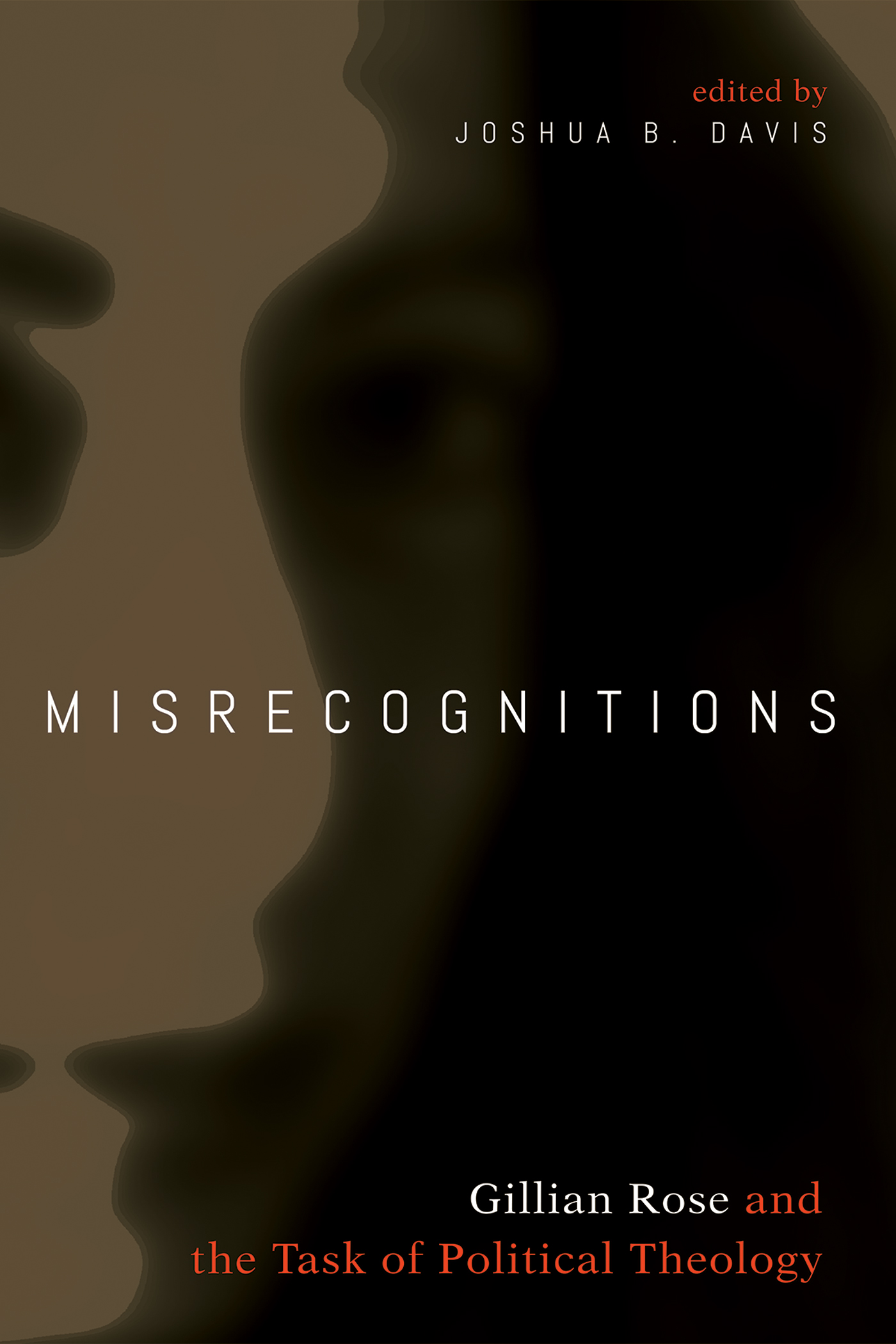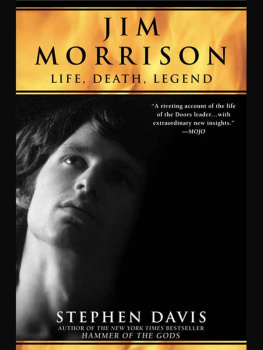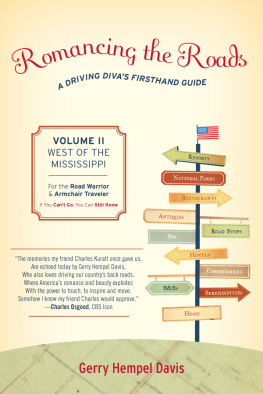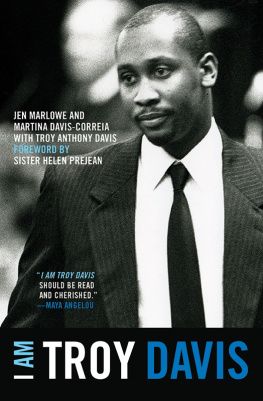Davis - Misrecognitions
Here you can read online Davis - Misrecognitions full text of the book (entire story) in english for free. Download pdf and epub, get meaning, cover and reviews about this ebook. year: 2018, publisher: Cascade Books&Wipf and Stock Publishers, genre: Politics. Description of the work, (preface) as well as reviews are available. Best literature library LitArk.com created for fans of good reading and offers a wide selection of genres:
Romance novel
Science fiction
Adventure
Detective
Science
History
Home and family
Prose
Art
Politics
Computer
Non-fiction
Religion
Business
Children
Humor
Choose a favorite category and find really read worthwhile books. Enjoy immersion in the world of imagination, feel the emotions of the characters or learn something new for yourself, make an fascinating discovery.

Misrecognitions: summary, description and annotation
We offer to read an annotation, description, summary or preface (depends on what the author of the book "Misrecognitions" wrote himself). If you haven't found the necessary information about the book — write in the comments, we will try to find it.
Misrecognitions — read online for free the complete book (whole text) full work
Below is the text of the book, divided by pages. System saving the place of the last page read, allows you to conveniently read the book "Misrecognitions" online for free, without having to search again every time where you left off. Put a bookmark, and you can go to the page where you finished reading at any time.
Font size:
Interval:
Bookmark:

Gillian Rose and the Task of Political Theology
Edited by Joshua B. Davis

By Way of the Valley of Roses
Joshua B. Davis
... There are achievements that carry failure on their back, blindness not as in Brueghel, but unfathomably far-seeing.
Geoffrey Hill
Weve got to bring the soul and the city back together somehow and stop separating them off intellectually and culturally. I think that, in the wake of the perceived demise of Marxism and of Heideggers Nazism, everybodys looking for an ethics. But in fact they should be looking for a political theology. We need to think about God and the polis and not about this anodyne love ethic.
Gillian Rose
G illian Rose is equivocallike the middle she commended to us. She is not ambiguous and in no way coy. She is vulnerable and difficult. Before her death to ovarian cancer at the age of forty-eight in 1995 , Rose wrote a sizable body of work that is as fierce in its beauty as it is strange in its passions. The cornerstone of her project is an idiosyncratic and, some might say, dubious reading of Hegel, but it is a reading that is often most instructive at the point that her voice overwhelms Hegels. She attempted to reestablish critical theory on that reading of Hegel, and developed out of it a unique analysis of modern society and philosophy, which made jurisprudence the central focus. She challenged the fundamental tenants of social theory, structuralism, and postmodern philosophy championed by her contemporaries, and she did so with a vision whose main themes were established early, even as they expanded in scope and changed in subtle ways. Nevertheless, despite her boldness, candor, and consistency, there is an unusual variance in interpretation among Roses readers.
For some Rose is the erstwhile Marxist, a child of the Frankfurt School, who boldly set out to forge a path beyond their impasses. For others, Rose is a relentless political realist, forcing us to submit our utopian and revolutionary illusions to the compromised struggles of everyday political life. For others, Rose is the paragon of a politics of recognition, the attempt to found a broad and pragmatic cosmopolitan liberalism on the phenomenological critique and embrace of our limitations. For others, she is one of the great Jewish philosophers of the twentieth century, and rightfully takes her place among the other women thinkers of Jewish historyRahel Varnhagen, Hannah Arendt, and Rosa Luxemburg, whom she names explicitly. For yet others, Rose is a religious thinker, a Jewish philosopher, a nascent Christian theologian, and perhaps some kind of mystic.
Perhaps this variation in interpretation is due, at least in part, to Roses relentless compelling of her readers to interrogate their immediate assumptions about the world, themselves, and others. Indeed, Rose wants to situate the critique of illusion at the center of social life, a task made all the more imperative, according to her, by the fact that modern social life is riven by the contradictions of bourgeois law. My relation to myself, she says in perhaps her most lapidary formulation, is mediated by what I recognize or refuse to recognize in your relation to yourself. This well captures what is at stake on the matter of equivocation. What matters in how I understand myself is not the truth that I succeed in communicating either to myself or another, but that I understand myself on the basis of what I recognize or misrecognize in how you understand yourself . Social relations are complex, dynamic interchanges that proliferate exponentially through these reciprocal variations of recognitions and misrecognitions. We never secure communication, meaning, or knowledge of ourselves or another, but this is not a sadalthough it may require mourningbut happy fault, a felix culpa . This movement of understanding, failing to understand, and yet continuing to speak and understand is a relation, whether to the world, ourselves, or another. Rose is not captivated by what we cannot grasp in the relation, but by the fact that communication and knowing always take place in a relation.
So, Rose is equivocal, but this is as much about us, her readers, as it is about her. Of course, this fact is no truer of Rose than any other writer, but she is relentless in exposing us to the experience of that fact. One may read and reread one of Roses works, even just a paragraph, and experience the difficulty, the struggle to comprehend, the dynamic movement of meaning as it happens in what we recognize or fail to recognize in our relation to her. This is certainly true of her early works, which she tells us are written in the severe style, and which trod through the esoteric worlds of German Idealism and critical theory. But it is no less so with her late, autobiographical writings, which are colloquial and meditative. Rose gives us the experience of the work, the struggle that is involved in all hearing, knowing, seeing, loving.
Unlike the major postmodern theorists who were her contemporaries, Rose was adamant that truth and meaning are real and not simply arbitrary. What interested her was not the absence or instability of truth, but the fact that unpredictability and even failure are essential aspects of all truth worthy of the name. For Rose, every act of communication or meaningful understanding entails a fundamental riskof failure, falsehood, misunderstanding, devastation, loss. These acts have no sure place from which to begin or end, but all meaning, love, joy, and justice in the world is real because it was risked. Rose is enthralled, enraged, invested by this strange reality that even our failures bond us, communicating and meaning sometimes much more than what we take for our successes. The meaning, the truth, that happens between us, the world, and othersa meaning of which we are often unawarethis is law, for Rose, and it cannot be obviated.
Readers of this collection of essays on Rose and political theology will surely be struck by the differences of interpretation and emphasis in her work. Each of these authors is indebted to Roses reading of Hegel, contributions to critical theory, and social philosophy, and believes that her work is of considerable significance for political theology. They depart from one another, sometimes in considerable ways, in how they understand the development of Roses work, how to interpret some of her key themes, and what their implications are for political theology. The result can, in some instances, make for sharp divergences not just regarding the details of Roses body of work, but of its overall trajectory. Nevertheless, several key concepts in Roses writing recur throughout these essays, and these are concepts that are of special importance for her works relationship to political theology. These concepts are engaged, sometimes explicitly, sometimes implicitly, by each of the authors in the collection. A brief rehearsal of them, then, will be helpful for the reader.
Political Theology
Some clarification about the use of the term political theology and what it means in the collection are in order. Political theology is itself equivocal. It has one quite specific meaning within the discipline of academic theology, a different but often overlapping meaning within religious studies and critical theory, and a still further meaning that is specific to Roses The Broken Middle . First, within theological studies, the term refers to a series of German theologians, like Johann Baptist Metz, Dorothee Slle, and Jrgen Moltmann, who at the close of the 1960 s and beginning of the 1970 s drew on the resources of critical theory to think through the reasons for German Christians failure to resist Nazism. Political theology, in this sense, represented an attempt to develop the social and political implications of Christian faith in direct relation to social, material, and historical life. It was a development within European Christianity, however, and one that wanted in particular to critique its bourgeois form. These distinctive qualities distinguished it from liberation theology, which was also intent on developing the political implications of Christian theology, but which arose from among oppressed and minority communities in colonial and postcolonial contexts.
Font size:
Interval:
Bookmark:
Similar books «Misrecognitions»
Look at similar books to Misrecognitions. We have selected literature similar in name and meaning in the hope of providing readers with more options to find new, interesting, not yet read works.
Discussion, reviews of the book Misrecognitions and just readers' own opinions. Leave your comments, write what you think about the work, its meaning or the main characters. Specify what exactly you liked and what you didn't like, and why you think so.

















